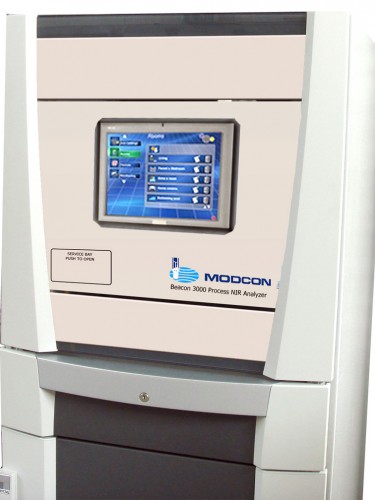Refineries must be flexible to respond to the changing demands and prices of crude oils, distillates and other refinery products. These can surprise at any time. Therefore, successful refineries must have the capability to immediately respond to these fluctuations. If not, millions of dollars may daily be lost.
Laboratory analyses, from sampling until providing analytical results, are time consuming and are definitely an inefficient method to run continuous processes. Effectiveness and flexibility can only be achieved by on-line and centralized monitoring of the quality of feed and refinery products during its processing. Implementation of an integrated system of correlative process analysers is inevitable to gain full control of the various processes which take place in a refinery.
Correlative analyzers are able to quantify a wide range of physical properties by one instrument and by one single measurement. By that, the need to invest in on-line process ASTM based process analyzers, which are expensive and in many cases require enormous investments in maintenance, is drastically reduced. Investment in corrolative analysers is relatively low as compared to the overall price to be payed for delayed detection in production of off-spec materials, or running production units in a none-optimized mode.
Modcon – Systems introduced new concept for total refinery control by launching two on-line process analyzers which are based on different spectral technologies:
BEACON 3000 – Near infrared (NIR) based process analyzer.
MOD-4100 – ASTM-based process analyzers technology.
Optical spectrometry based analyzers, like UV, NIR and Raman, are restricted to transparent liquids only, while MOD-4100 analyzers measure transparent and opaque process streams alike. Beacon 3000 NIR process analyzers have been proven to be reliable correlative analyzers in refineries to predict physical properties of transparent process streams, like light CDU distillates, FCC Naphtha, and gasoline blending. They instantaneously can measure up to eight different process streams.
To illustrate the concept of an integrated system of ASTM and NIR process analyzers, the CDU is taken as an example. It should be noted that the same concept is adaptable in all refinery process and blending units.
The CDU contains transparent process streams where Beacon 3000 – NIR analyzers can be applied. Opaque, dense process streams of the CDU can only be monitored by the MOD-4100 process analyzer.
Based on transparency of process streams and frequency of crude switching, NIR or a combination of ASTM and NIR analyzers is very effective to fully monitor the behavior of the entire CDU process.
Anacon software, with incorporated Free-rune software guarantees accuracy and reliability of analytical results. The correlative process analyzers are ongoing validated against laboratory measurements. The results of all analyzers are user-friendly displayed in the central control room.
Optimized process control requires continuously to be informed about all physicochemical properties of feed and each product stream. Updated real time analytical data, allows operators to adjust process parameters as such that the production unit will always run in the most optimized and economic mode. Refining margins will increase, while energy consumption can be decreased. The revenue of a refinery unit will definitely improve, which provides return of investment (ROI) within a short period of time.







